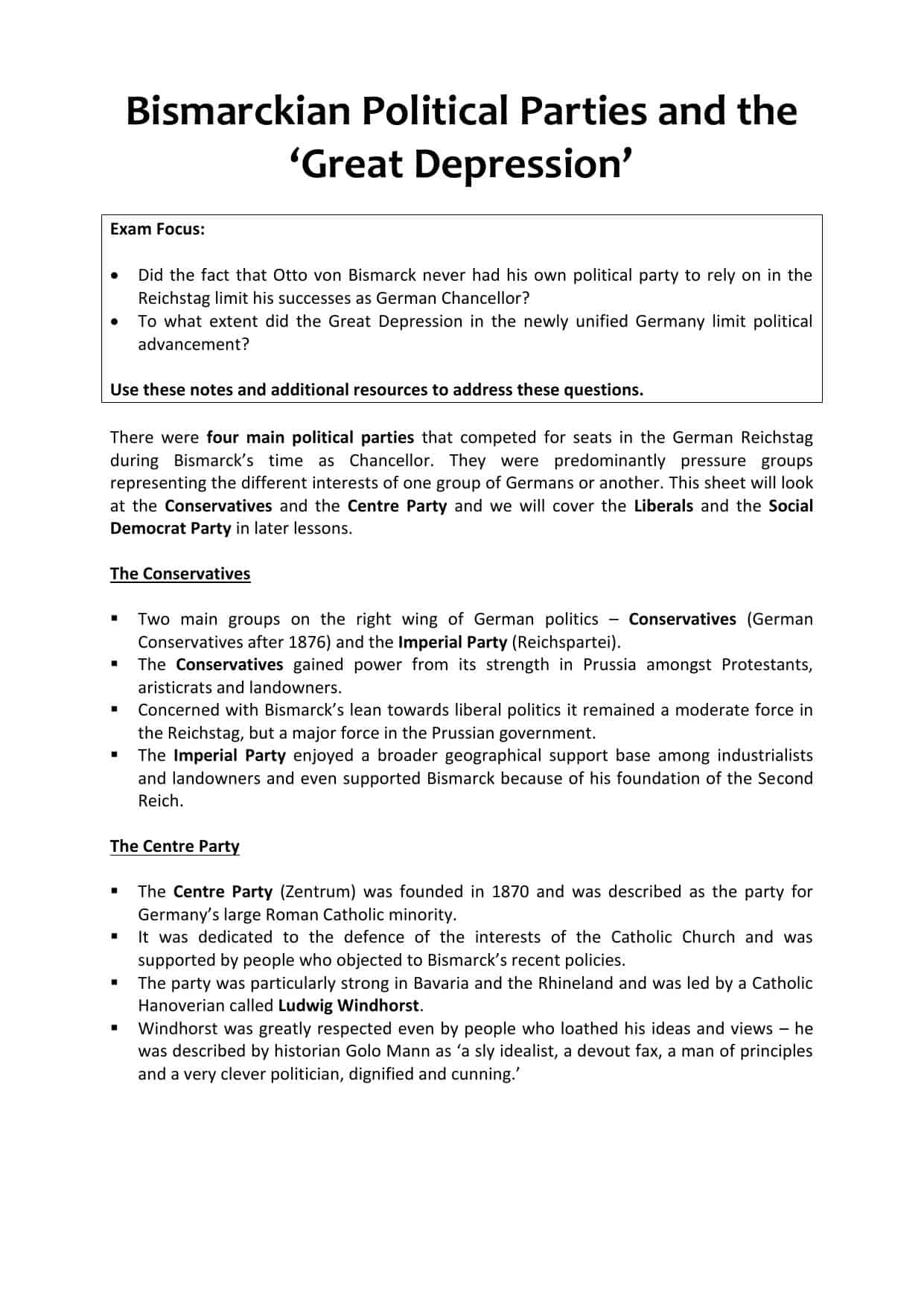Premium

Download Bismarckian Political Parties & The Great Depression
Click the button below to download this worksheet for use in the classroom or at home.
Download →
Exam Focus:
- Did the fact that Otto von Bismarck never had his own political party to rely on in the Reichstag limit his successes as German Chancellor?
- To what extent did the Great Depression in the newly unified Germany limit political advancement?
- Use these notes and additional resources to address these questions.
Lesson Snapshot:
There were four main political parties that competed for seats in the German Reichstag during Bismarck’s time as Chancellor. They were predominantly pressure groups representing the different interests of one group of Germans or another. This sheet will look at the Conservatives and the Centre Party and we will cover the Liberals and the Social Democrat Party in later lessons.
The Conservatives
- Two main groups on the right wing of German politics – Conservatives (German Conservatives after 1876) and the Imperial Party (Reichspartei).
- The Conservatives gained power from its strength in Prussia amongst Protestants, aristicrats and landowners.
- Concerned with Bismarck’s lean towards liberal politics it remained a moderate force in the Reichstag, but a major force in the Prussian government.
- The Imperial Party enjoyed a broader geographical support base among industrialists and landowners and even supported Bismarck because of his foundation of the Second Reich.
The Centre Party
-
- The Centre Party (Zentrum) was founded in 1870 and was described as the party for Germany’s large Roman Catholic minority.
- It was dedicated to the defence of the interests of the Catholic Church and was supported by people who objected to Bismarck’s recent policies.
- The party was particularly strong in Bavaria and the Rhineland and was led by a Catholic Hanoverian called Ludwig Windhorst.
- Windhorst was greatly respected even by people who loathed his ideas and views – he was described by historian Golo Mann as ‘a sly idealist, a devout fax, a man of principles and a very clever politician, dignified and cunning.’
Great Depression and its Political Impact
- For much of the Bismarck era the political life of Germany took place alongside a background of economic anxiety and depression.
- German bankers were very generous with their loans after the reparations from the Franco-Prussian War and gave over generous credit policies to companies etc.
- This sparked off a lot of unsound investment projects which eventually collapsed in a dramatic fashion and struck a blow to business confidences which was still felt 20 years later.
- In terms of production and economic growth the country recovered from the depression quite quickly. Production levels of 1872 – 73 were reached again by 1880.
- Urban growth was not affected by the Great Depression.
- The main effect of the Great Depression was psychological – people just felt unsure and
worried about financial investment well beyond 1880. - The main political impact of the depression was to mobilise conservative economic
thinking – people wanted economic protection to prevent another Great Depression –
they wanted an end to free trade policies. - The following pressure groups were formed – League of German Iron and Steel
Manufacturers in 1873 and the Central Association of German Industrialists in 1876. - German agriculturalists then joined in by demanding the end of free trade and asking for
protective tariffs. - The real impact of the Great Depression was that it influenced almost all of Bismarck’s
domestic policies between 1870-1890.
Worksheet Task:
- Aimed at Students studying across AS/A2 or equivalent
- Premium resource
- Use as you wish in the classroom or home environment
- Lesson fact file on Bismarckian Political Parties & The Great Depression.
- Use with other German Unification resources.
- Includes challenging questions.
